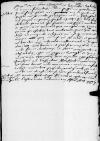List #1619
[Ioannes DANTISCUS] do UNKNOWNLöbau (Lubawa), 1537-04-07
Rękopiśmienne podstawy źródłowe:
Publikacje:
| ||||||
Tekst + aparat krytyczny + komentarz Zwykły tekst Tekst + komentarz Tekst + aparat krytyczny Ekscerpty dotyczące podróży Dantyszka
Magnifice Domine, Amice carissime et honoran(de) or honoran(dissime)⌈honoran(de)honoran(de) or honoran(dissime)⌉. Salutem et omnem felicitatem.
Non possum non quodammodo pudefieri, quod postulati on the margin⌈postulatipostulati on the margin⌉s Magnificentiae Vestrae, quibus cui in quibus possum non gravate gratificari velim, satisfacere ad praesens nequeam, quandoquidem equorum, qui boni dici deberent, penuriam ipse patior. Acceperam in mutuum a
Ex

 BCz, 244, p. 209
BCz, 244, p. 209